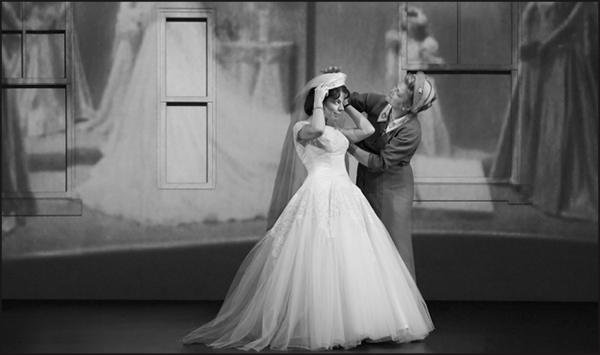By Scott Harrah
A CATERED AFFAIR Book by Harvey Fierstein
Music & lyrics by John Bucchino
Directed by John Doyle
Walter Kerr Theater
219 W. 48th St
(212-239-6200;
www.acateredaffaironbroadway.com)
On the surface, Harvey Fierstein’s stage adaptation of the 1956 MGM film “The Catered Affair,” which originally starred Bette Davis and Debbie Reynolds, does not lend itself to what we normally expect of Broadway musicals. Sure, there’s music and singing, but no flashy costumes or complex choreography with a stage full of dancers and singers. The story, about a working-class Bronx family that wants to put on a grand wedding for their only daughter, is gritty, realistic and more gloomy than romantic. However, despite the utilitarian set and forgettable score, “A Catered Affair” is still a compelling tale of people trying to live out their dreams in 1950s America.
The real star of the show is hardly Fierstein. Faith Prince, as the mother Aggie Hurley, gives a marvelously textured portrayal of a woman who’s just lost her son in the war and wants to give the best wedding money can buy for the daughter she feels that she’s neglected for years. Prince, it should be noted, recently received a Tony nomination for her performance here, as did with Tom Wopat. Leslie Kritzer as Jane Hurley, the bride-to-be, is equally effective playing a simple character who only wants a civil ceremony and no opulent reception. She and her mother have had a strained relationship for years, but Aggie wants to make up for lost time and do the right thing to give her daughter a wedding she will always remember.
John Doyle directs the cast at an almost robotic pace, and only Prince and Kritzer seem to be in sync, but the book is just too somber and the songs seem tacked on. Fierstein, who adapted the show for the stage from Gore Vidal’s screenplay, plays the uncle, Winston, with his trademark flamboyance, none of which was ever in the original movie. (In the film, Winston was simply a bachelor, not gay) Fierstein also delivers his lines and sings in a hoarse rasp, but it’s not nearly as whimsical as it was when he played Edna Turnblad in “Hairspray.” Here, Fierstein mostly sounds like he’s out of breath half the time. Winston is a supporting character, and his best acting moments are when he learns that he, along with many others, will not be invited to the wedding because his niece Jane and her fiancé, Ralph Halloran (Matt Cavanaugh), want the ceremony to be for “immediate family” only. Winston, who’s been living on his sister’s sofa, is about to leave to go live with his male partner, and soon Aggie and her taxi-driver husband Tom (Tom Wopat) will be all alone.
Tom is totally against his wife’s wishes to blow most of their life’s savings on the wedding because he has a chance to buy his taxi with his business partner from the owner, be needs money to close the deal. Much of the story’s tension revolves around Aggie’s claim that she’s been trapped in a “loveless” marriage, while Tom maintains that he has stood by her for decades. Wopat’s performance is not nearly as polished as Prince’s or Kritzer’s, but he manages to tell off his wife with convincing fervor in one of the show’s cathartic final scenes.
What keeps “A Catered Affair” from appearing too dated is the fact that it poses the timeless question of what the purpose truly is of an expensive wedding for families of any socioeconomic level. Regardless, “A Catered Affair” would be much more appropriate as a straightforward dramatic play than a musical. Songs such as “Your Children’s Happiness” and “Don’t Ever Stop Saying I Love You” do nothing to propel the plot forward. We keep waiting for a rousing song and a gleeful moment of choreography to brighten up all the drabness and bring the proverbial house down, but one simply never comes along. “A Catered Affair” is far too lugubrious to be enjoyable for most fans of musical theater. Still, the story has a lot to say about family ties, and Faith Prince and Leslie Kritzer give the show enough dramatic panache to make it worth seeing.


































